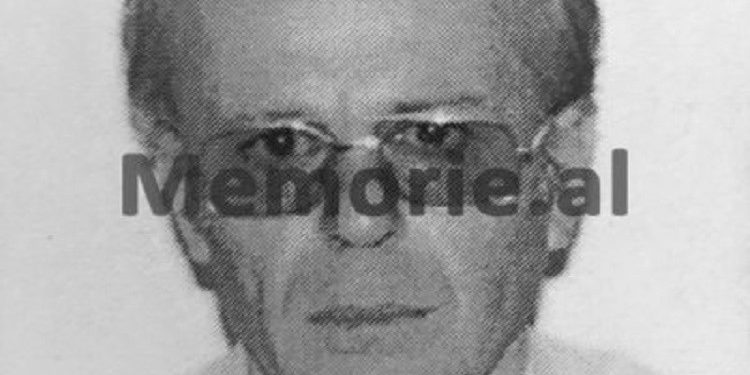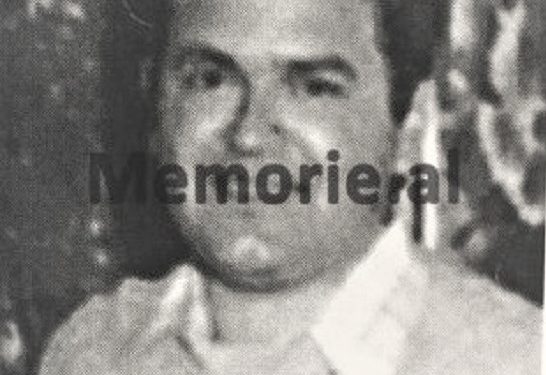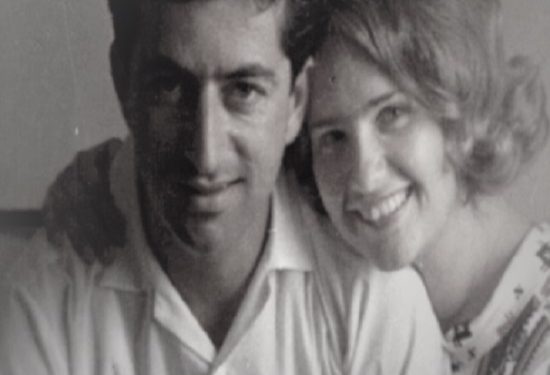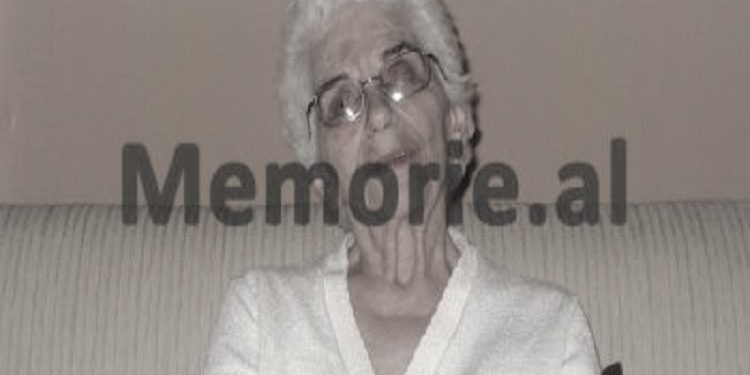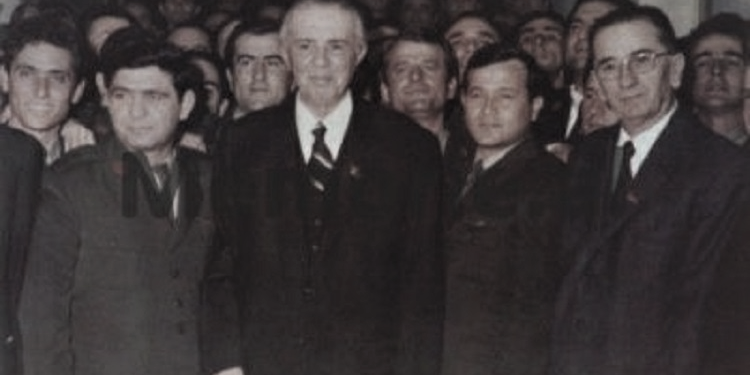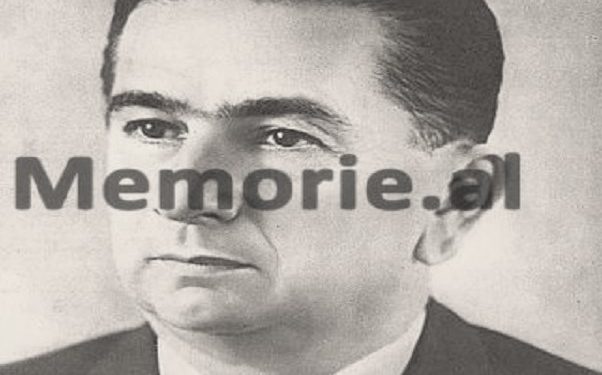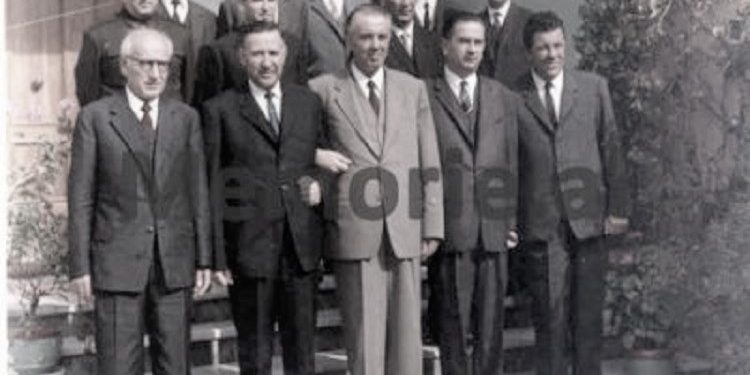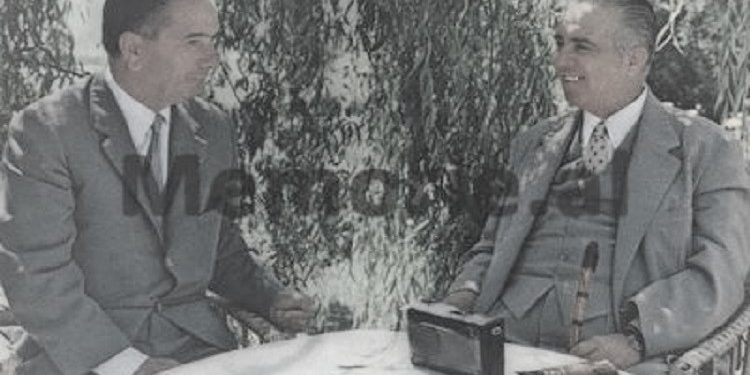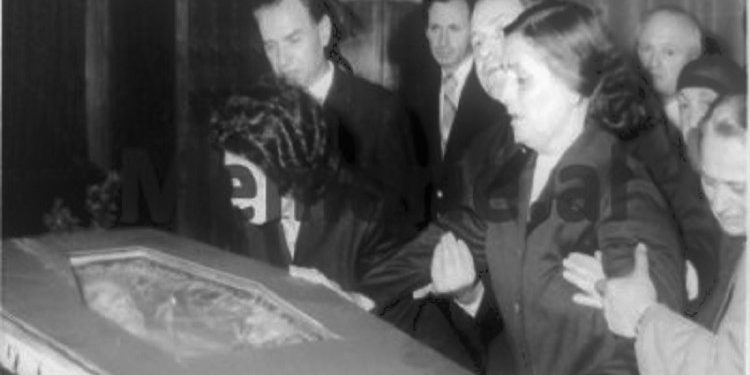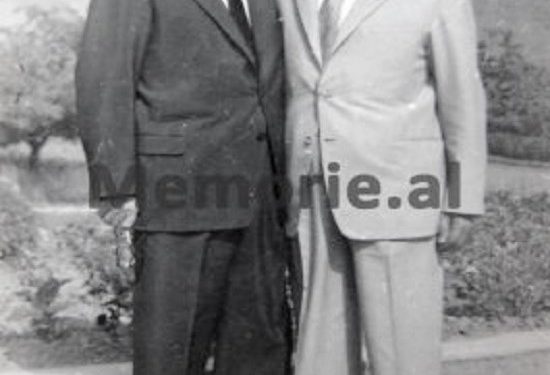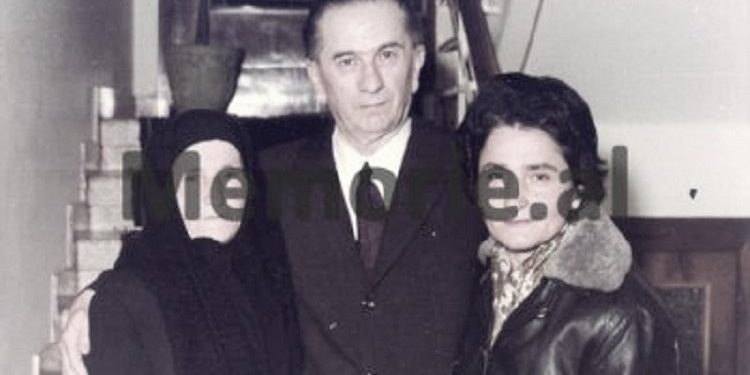Dashnor Kaloçi
Memorie.al/publishes the unknown story of the family of Hysni Kapos’s brother, Sulejmani, former partisan and after the war with high and important functions, as the Prime Minister and Director of the State Treasury, who in 1975, arrested one by the boys, Alajdin Kapon, who served as a naval officer on the ship “Durrësi” and was sentenced to 15 years in political prison, accusing him of “group leader”, for “agitation and propaganda, hostile espionage and smuggling activities.” The rare testimony of Vladimir Kapos, Alajdin’s brother, who was removed from the Opera House where he was a pianist and interned in Kuçova, after his father-in-law was also sentenced, as well as other sentences with Hysni’s first grandchildren and cousins Kapos who ended up in the prisons of the communist regime of Enver Hoxha and Hysniu did not intervene for any of them…?!
Although he held the highest positions in the pyramid of the communist regime after Enver Hoxha, having under strict party and state control the organs of the Dictatorship of the Proletariat, such as the Ministry of Interior, State Security, Army, Courts, Investigation and Prosecution, Hysni Kapo he could not escape from the prisons of that regime, some of his nephews and closest blood relatives. In no single case did he intervene to save them from the long handcuffs and prisons where they suffered until the 1990s. But what were the real reasons that the communist regime, through the State Security, hit exactly the relatives of the powerful man?! In this regard, Vladimir Kapo, the son of Hysni’s brother, one of the first pianists of the Opera and Ballet Theater who has been interned in Kuçova, introduces us to his exclusive testimony for Memorie.al?!
Mr. Vladimir, before we talk about the arrest and sentencing of your brother, Alajdin, can you tell us briefly, where he was educated and where he lived?
After finishing the third year of high school in Tirana, Alajdini went to Vlora where our married sister, Flora, lived at that time, and there he finished high school. He then asked to study at the Merchant Navy School in Vlora, where he graduated in 1968. After graduating, Alajdini was appointed as an officer in the Merchant Marine Fleet, where for 10 years he served on the ship “Durres”. With that ship he traveled to several European countries, until he was arrested in 1977.
How do you remember Alajdin’s arrest?
It was the afternoon of April 30, 1977, when a “Gas” of the Internal Branch of Durrës, stopped in front of the entrance of our building at the Cinema “Dajti” where we lived at that time. One of the people who got out of that car, knocked on the door of our house and when Alajdini came out, he said: “Come on, we have a job on the steamer”. Without thinking at all what awaited him, Alajdini quickly got dressed and went down with the person who was looking for him, riding in the “Gaz” that was waiting for him in front of our palace. As Alajdini himself told me, years later when he got out of prison, as soon as he got on “Gaz”, he was put in bars and those who arrested him were all friends of our uncle, Enver Kapos, (Hysni’s brother) former / vice president of the Durrës Internal Branch.
When did you learn the truth about what had happened to Alajdin?
We learned that night, after the Director of the Directorate of Internal Affairs of Tirana, Nusret Dauti, called our father, Sulejmani and told him that Alajdini had been arrested by the Durrës Branch of Internal Affairs, for hostile activities against the state and the ship “Durrësi” where he worked, had been the center of that activity. He also informed his father that with our brother, three of his colleagues were arrested, other officers of the ship “Durrësi”, who together with Alajdin, were accused of smuggling, agitation and propaganda and espionage. These things we later heard from other people as well.
How the arrest of Alajdin was received in your family and did your father, Sulejmani, meet with his brother, Hysni Kapon about that problem?
Alajdin’s arrest fell like a bomb on us, because in those days he was quite calm and did not even think of such a thing. This, not for the fact that he was the nephew of Hysni Kapos, but for the sole reason that Alajdini, was a very correct man both at work, family and in society. During the time he was working in the Merchant Navy, his father had been there several times, and three days before his arrest, he had met with the commissar and the captain of the steamer, who had spoken the best words to him.
What happened to your family after that event?
After Alajdin’s arrest, the father suffered a severe spiritual shock and was constantly extremely anxious. He did not say a word to us children, about what had happened to us and everything he talked about, only with our mother. Even with his brother, Hysni, he did not go to talk about that problem, as such had the relationship between them.
Specifically, what was the relationship like between the two brothers and their families?
The family relations of our uncle, Hysni, with our family and his other relatives, were very good. Our families came and went to each other, quite normally, not only for the reason but also without any occasion. This is also due to the fact that in his house, that is, his uncle, Hysni, lived our grandmother, Mezeja, who asked us to go to her house.
What about you nephews, how did Hysni treat you?
Hysniu loved us children very much and especially us Sulejmani, but also Enver who lived in Durrës. But Hysniu had informed his brothers and sisters in time, saying: “I have 11 brothers and sisters and many grandchildren. For any trouble you have, go to the Party and state offices “.
With this, Hysni had “closed the door” to his brothers and sisters, and this was the reason why your father did not go to meet him when Alajdin was arrested?
In a way, yes and based on this fact, the father did not go to meet Hysni, as it was well known that those who had ordered Alajdin’s arrest knew well that he was his nephew. This fact closed everything and extinguished all our hope.
How long did Alajdini stay with the Investigator, how was he treated there and were family members allowed to meet him?
Alajdin was held in the Durrës Investigation for five months, until the beginning of October 1977, during which time he was not physically abused. But the psychic torture of course there was against him. During that period we had no contact with him, except when we sent him some food and underwear. Our brother, Fatos, once tried to go to meet Alajdin, but we were advised not to do so.
Who did you consult?
We were never told exactly who and we could not ask about it, but we certainly knew where that advice was coming from, which was actually given to us so as not to hurt us anymore.
What was Alajdin asked during the investigation and you, were you ever called to the Investigator?
During the time he was in the Investigator, we did not know what they were asking him about, but years later when he was released from prison, he also told me some strange things that had nothing to do with what he was accused of. Among other things, during the investigation Alajdin was asked who Hysni Kapo valued and preferred the most from the senior leadership of the ALP. During Alajdin’s investigation, I was personally summoned several times to the Investigator to ask him, after I had given him a few dollars, to buy me a fishing tackle, for my daughter-in-law’s cousin and a watch, for a our friend who married the nephew. All of these stood and we accepted them as they were.
It is said that before Alajdini was arrested, Feçorr Shehu went to Hysniu and said: “Here is your nephew’s file, what should we do”, and Hysniu said: “In prison, like everyone else”. Is this true?
We have also heard this, but it happened not with Feçor, but with Kadri. Feçorri could not go to Hysniu for that problem before Kadri.
Where were Alajdin and his comrades tried and how many were convicted?
The trial against them took place in Durrës and although Alajdini did not accept any of the charges against him, he was sentenced to 15 years in prison for “agitation and propaganda, smuggling and espionage”. Three of his colleagues and comrades were less convicted, as Alajdini was considered group leader. All this we told the others, as none of our family assisted in the trial which lasted several days.
After Alajdin’s sentence, did your family have any consequences?
Ever since Dini was arrested, I have been fired from the Opera House, where I worked as a pianist and as a party candidate. After that I was sent to Stalin City (Kuçova) as a music teacher in an eight-year school where I worked for several years.
What about the other family members?
The other members of our family did not move, as Brother Fatos and his two sisters were married and living apart from us. But the attack on me did not end there, as at that time my father-in-law, Koço Nini, who worked as a chief accountant in an Agricultural Cooperative on the outskirts of Tirana, was arrested and sentenced to 8 years in political prison.
What happened to him and why was he charged?
He was accused of agitation and propaganda, ostensibly as saying that state shops were empty. His sentence was made to link him to my person, as if he had influenced my “smuggling” activity.
What about other members of your father-in-law’s family, were there any problems?
After his sentence, the son of my daughter-in-law’s uncle, Taqi Nini, from Saranda, for whom I had ordered Alajdin, for fishing tools, was also arrested and sentenced to 8 years in political prison. Taqi was a fishing lover and he was also convicted of illegal possession of a weapon, for a small knife held by all those who fish with hooks. After all that happened to us, all our friends and relatives left our family.
Returning to the family of Hysni Kapos, what relations did your family have with him after Alajdin’s sentence?
Of course the relationship between our families changed not for the better. After Alajdin’s sentence, the father did not go to Hysni’s house alone because he did not want to burden him.
Even when Hysniu died they did not go…?
Babaj, Sulejmani and other members of our family went there only for consolation when Hysni died. Me and some other members of our tribe who were considered stained in the biography, did not allow us to attend either the homage to the People’s Assembly or the funeral.
Who communicated this to you?
We were informed by my little uncle, who had been ordered by Kadri Hazbiu, who had taken over everything at the funeral of our uncle, Hysni. And we could not go to the homage or the funeral, even though there was a long line of people who loved him and did not love him.
Going back to the accusations made against Alajdin, did they stand?
The accusations of “espionage and hostile activities” were completely fabricated and did not stand in any case, while those of smuggling were very inflated.
What about similar cases, so I am talking about those of smuggling, which is known by everyone who has had throughout the period of the communist regime, with sailors and those who worked in the port, do you know how it was done?
In the past in the Merchant Navy, there had been plenty of such cases and the biggest punishment that was inflicted on them was their transfer for 6 months, to fishing boats. While in the case of Alajdin, it was inflated so much that the entire crew of the ship “Durrësi” was dispersed or fired, to create the psychosis that that ship had been the center of hostile activity and smuggling.
Can you tell us specifically, what smuggled goods were in question?
Din was smuggled to any fish given to them by various port workers to smuggle the ship out. I am telling you only one fact, when they arrested Dini; they found only 60 thousand old lekë in the booklet, which were the savings of 10 years of work. And those lekë that were not much for the big salary, which he had as a naval officer, Dini collected after the insistence of his father, who said to him: you will get married”.
Where did Alajdini serve his sentence and where did he work after his release from prison?
He served his sentence first in Qafë-Bari and then in Ballsh, and was released in 1984, serving 7 years of his sentence, having earned the rest through work and amnesties. The day he was released from prison, Brother Fatosi came out, met Alajdin on the train, and brought him home.
Where was he settled with work after his release from prison?
He did not stay home long, as his father found him a job as a dispatcher in the Shipping Park in Tirana. Later, in 1986, he got married and was given a small house, somewhere at the Tractor Plant.
What about the family of Alajdini’s bride, did she have problems with the regime?
The father of Alajdin’s bride (Teuta Ademi) was also sentenced to two years in prison. From that time, Dini’s relations with our family began to normalize, after Enver Hoxha had died and the communist system, something was changing.
How long did Alajdini work and where did he go next?
At Spedition, Alajdini worked until 1990, when he left Albania with the first ship exodus in March ’91. Since then he lives and works with his wife and son in Milan, Italy.
During the time he was in the Investigator and then in prison, did your father, Suleiman, try to meet with any of the top leadership to ask for his help?
For Alajdin’s problem, the father met with Rita Marko, who was very willing and promised to help him.
What about the other man, asked for help?
Yes, then the father sent a letter to Adil Çarçani, where he explained everything that had happened to our family, because besides Alajdin, the communist regime of that time, had sentenced in political prisons and some other nephews and relatives of Hysni Kapos .
What was Adil Çarçan’s answer?
After this letter, Adil called his father and said: “What are all these things you are telling me, Sulo, we did not know”.
Another man from the top leadership, contacted Suleiman?
Haxhi Lleshi, came to our house twice, demonstratively to give us courage. The father met with them then about Dini’s work and with no one else, he had not talked about that problem.
After Hysni’s death, what relations did you have with his family, Viton, his two sons and his daughter?
I was also impressed by the fact that after what happened to us, ie Dini’s sentence and other problems with our relatives, when we all left, Hysni’s children, Besnik, Vera and her husband, Mehdi Bushati did not change their position to us. We have been very impressed by this fact.
But in the life of Hysni, what was their attitude towards you, after what happened to you?
They have maintained a very benevolent attitude towards us. In fact, when it happened to Alajdin, they had openly said to Hysni at home: “What are these things happening to us?”, and he had replied: “Look at the work, the Party knows that”.
What conclusions have you drawn regarding the reasons for the sentencing of Alajdin and other relatives of Hysni Kapos?
We discussed this problem a lot with our father and while he was alive, he was convinced that everything that happened to us was done to hit and discredit Hysni Kapo. For this they found his weakest point, where it hurt him the most: Brother Sulejmani, whom Hysniu condemned and respected more, as he had him instead of his father. In various conversations that took place afterwards with many friends and relatives, they were considered as intrigues of a small part of the senior leadership, living in the “Bloc”, who saw Hysni as a descendant of Enver Hoxha. And given the fact that they aimed at that place themselves, they fought him with everything they had at hand to tarnish and tarnish his image. He was an absurd system, often eating his creatures as well.
The vicissitudes of the family of Sulejman Kapos, Hysni’s older brother
Vladimir Kapo was born in the city of Vlora in 1942 and he is the son of Hysni Kapos’s brother, Sulejmani, who was the second of the 13 brothers and sisters of the former, senior communist leader of Albania, originally from Tërbaçi, Vlora. . Vladimir’s father, Sulejmani, was the eldest of Hysni Kapos’ brothers, and together with Hysni he had studied at the Vlora Business School since the years of the Zog Monarchy.
After the death of their father, Kapo Abazaj, in the late 1930s, Sulejmani took his place and he took care of his 12 younger siblings. Since 1940, Sulo had competed and won a job at the National Bank in Tirana, but after two years he was fired because of his brother Hysni, whom the Italians had listed as a senior exponent of the SNP.
After that, Sulo was arrested and interned in the Porto-Romano camp in Durrës. After his release from prison, he went to the Dukat to take refuge with his sister, who was married in a village where the influence of the Balli nationalists was great. At that time, “Balli Kombëtar” spread the word that Sulo had passed by them and based on this fact, his brother Hysniu, in a letter wrote: “Where we will bake we will try”, letting them know that they shared only rifles. As a result of this situation where it happened, Sulo left Vlora and found refuge with Haxhi Lleshi’s squad in Debar and then in Mehmet Shehu’s First Brigade.
After the end of the war, he worked as the Director of the Bank in Vlora, the Director of the State Treasury and for 13 years in the Office of Complaints at the Prime Minister in Tirana. Vladimir is the eldest of Sulejman Kapos’ five children, followed by Flora, Alajdini, Fatos and Rajmonda, all of whom graduated from high schools. Vladimir began his higher studies at the Budapest Conservatory and after breaking off relations with Moscow; he returned and graduated in piano in Tirana. Although he was one of the first pianists to graduate in Albania, he was initially sent to an 8-year school in Vlora, and only a few years later was appointed to the Opera Theater, from where he would be removed in 1977, when of his brother, Alajdini was convicted of hostile activity.
“Punishments of the grandchildren of Hysni Kapos, who did not intervene to save any of them”
Alajdin Kapo, was not the only nephew of Hysni Kapo who was sentenced to political prison by the communist regime of Enver Hoxha. Before and after him, several others were convicted, the first nephews and cousins of man, who for years held the highest party and state functions, in the communist regime before the ’90s. The story of the sentencing of Hysni Kapos’s relatives begins in the 1950s, when the communist regime arrested his sister’s husband, Namik Ali Mëhilli, whom they accused of collaborating with the Balli Kombëtar. But when those charges were not substantiated, he was convicted of gambling. One of the other relatives of Hysni Kapos, who tried the prisons of that regime, was the son of his aunt, Myzafer Canaj from Vlora, who at that time worked as a driver of Ramiz Alia. Myzaferi suffered several years in prison, after several fabricated allegations that were never proven. A few years later, the State Security sentenced Hysni’s sister’s son, Bardhyl Mëhilli, who worked as a driver in Vlora Park, to political prison. Bardhyl was arrested in Përrenjas and accused of trying to escape from Qafë Thana. After the sentencing of Hysni’s brother’s son, Alajdin Kapos, a former Navy officer who suffered for several years in Qafë-Bari and Ballsh, the son of Hysni’s sister (Aphrodite) was also arrested and sentenced to several years in political prison. Vullnet Thanasi, who worked at the Albanian embassy in Prague. Albanian Intelligence people robbed him in Prague and brought him tied up in Tirana, where he suffered in political prisons until the 1990s. Among the last relatives of Hysni Kapos, who suffered from that regime, was Qemal Abazaj, (his third cousin) former border officer who was demobilized in 1980 in Librazhd, after Hysni’s death. Qemali was able to escape from prison, thanks to the intervention of Sotir Koçollari, the First Secretary of Librazhd. In all those cases of punishment of his nephews and relatives, Hysni Kapo never intervened to save them./Memorie.al




